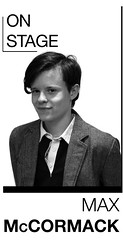 Music is a way of life. For young people, music is expression, emotion and even a lifestyle.But rarely in musical theater do we see our music on stage. From Biggie Smalls to the Beatles, great musical theater seems far from our iPod’s playlists.
Music is a way of life. For young people, music is expression, emotion and even a lifestyle.But rarely in musical theater do we see our music on stage. From Biggie Smalls to the Beatles, great musical theater seems far from our iPod’s playlists.
So this past Valentine’s Day, as I exited the converted Tomlinson Theater after a performance of Temple Theater’s The Seven, I began to wonder, when it comes to music and theater, how far is the iPod from the libretto?
Musical theater was once an odd genre – relegated to the back “soundtrack” section of the music store, much of it written by two old guys named Rodgers and Hammerstein. In contrast, The Seven, which ran from Feb. 5 to 22, used song and dance in a new, hip-hop way.
The show, written by Will Power and directed by Lee Kenneth Richardson, is a “retelling of Aeschylus’ The Seven Against Thebes through hip-hop,” said The Seven’s Kathryn Sullivan. Hip-hop and Greek tragedy? The show was proof that just about any kind of music can be crafted to work in a stage musical.
While I can enjoy a big Broadway classic now and then, it’s exciting to see the music we listen to used in this way. The Seven was by no means the first show to be built around non-traditional music. Hair will always be considered the groundbreaker here, showcasing music of a younger generation. Hair, the story of a handful of hippies living in the 1960s in New York City’s Central Park, is being revived on Broadway in March. And about 25 years after Hair first shocked Broadway theater-goers, Rent came along and, again, reinvented the way we see theater.
The hit contemporary hip-hop musical, In the Heights, follows a handful of street characters and their struggles in New York City’s Washington Heights. It won the Tony for Best Musical last year.
In 2006, Spring Awakening opened on Broadway to critical acclaim, using rock music to tell the stories of teenagers growing up in Germany in the 1890s. The edgy Duncan Sheik, an accomplished folk singer-songwriter, wrote the music, which won the adulation of legions of young fans and the Tony Award for Best Musical in 2007.
“I’ve only been involved in rock musicals,” said Jennifer Damiano, who was in the original Spring Awakening cast. “I think it’s because they’re so relatable to a younger generation, which I’m a part of.”
Damiano made her Broadway debut in Spring Awakening and, on April 15, will take on Broadway again with the modern musical, Next to Normal. Damiano, who stars alongside Alice Ripley and J. Robert Spencer, said she loves “anything with a modern edgy thrill.”
Along with the music, the story lines in shows like Next to Normal and The Seven also reflect modern cultural and social themes better than older, traditional musicals can.
“The process was surprisingly easy to develop in The Seven because the story is really relatable,” said Sullivan, who played Funky Fate in the Temple show.
If musical theater is going to appeal to younger audiences, they need to change with the times. Young people are looking to be shaken up by theatrical productions, including musicals.
“It’s impolite theater. It doesn’t beat around the bush,” Damiano said. “I love theater that’s moving and creates a new way to connect to the people on the stage. It’s intimate and real. It just so happens that rock musicals are associated with the edgy and the intimate.”
Sullivan agrees.
“Part of the reason I loved The Seven was because it shook people up. Some people don’t agree with it, but it was great to bring together these two worlds.”
The trend on Broadway to produce Disney spectacles is unsettling – based more on ticket sales than on originality and art. I’m hopeful that shows like The Seven and Spring Awakening will continue to swim against that tide. No one can predict where live theater is headed, particularly during the current financial downturn. But people will always love good music and good theater. It just needs to be relevant.
Max McCormack can be reached at edwin.mccormack@temple.edu.



Be the first to comment